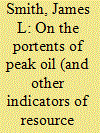| Srl | Item |
| 1 |
ID:
152529


|
|
|
|
|
| Summary/Abstract |
This article is a discussion of the “discourse on the unthinkable” surrounding potential future democratic engagements with rivers as non-human persons or natural objects. In the context of the Asia–Pacific region, this article suggests that the developments in material philosophy entitled “new materialism” are essential tools in the reconceptualisation of rivers as democratic entities but that local socio-historical conditions must also be taken into the account. In order to make its case, the article not only surveys the context for considering rivers as non-human persons in a juridical context but also discusses the new material context that assists modern democracies in the renegotiation of the demos that forms the body politic of democracy – often in the face of neoliberal exploitation and a legacy of extremes in instrumentalism. The article argues that the incorporation of water in the democratic project of enfranchisement is an essential exercise born of many Western beliefs and ideals but articulated uniquely at a regional and national level.
|
|
|
|
|
|
|
|
|
|
|
|
|
|
|
|
| 2 |
ID:
112291


|
|
|
|
|
| Publication |
2012.
|
| Summary/Abstract |
Economists have studied various indicators of resource scarcity but largely ignored the phenomenon of "peaking" due to its connection to non-economic (physical) theories of resource exhaustion. I consider peaking from the economic point of view, where economic forces determine the shape of the equilibrium extraction path. Within that framework, I ask whether the timing of peak production reveals anything useful about scarcity. I find peaking to be an ambiguous indicator. If someone announced the peak would arrive earlier than expected, and you believed them, you would not know whether the news was good or bad. However, I also show that the traditional economic indicators of resource scarcity (price, cost, and rent) fare no better, and argue that previous studies have misconstrued the connection between changes in underlying scarcity and movements in these traditional indicators.
|
|
|
|
|
|
|
|
|
|
|
|
|
|
|
|